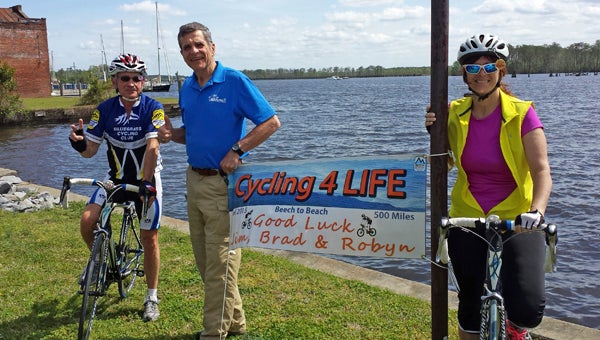A place to call home
Published 7:05 pm Monday, April 20, 2015

JULES NORWOOD
RIDE OF A LIFETIME: Brad Hardie (from left), Dr. Jim Taylor, and Robyn Hardie met with members of the Washington City Council on April 13, the day they rode into town on their autism-awareness cross-state ride. The trio made the trip from Beech Mountain to the Cape Hatteras lighthouse in two weeks.
On April 13, two cyclists rode into Washington. They beat the Cycle NC riders into town by a few days, but this trip wasn’t about a good use of leisure time or a hobby that takes cyclists along the highways and byways of North Carolina. This trip had purpose.
National Autism Awareness Month draws to a close soon and it was for this purpose that Brad and Robin Hardie, with their support vehicle driven by Dr. Jim Taylor, cycled the state from its highest point of Beech Mountain to the Hatteras lighthouse — to shine a spotlight on autism.
More importantly, Taylor — a 50-year special education veteran — is on the forefront of a new movement, that of group homes for those with autism spectrum disorder. In the next 15 years, over 500,000 children diagnosed with ASD will become adults. With every one in 56 children being diagnosed with ASD, that number will continue to grow.
In ages past, adults with disabilities were shuttled into institutions, all too often the functional lumped in with those with extreme disabilities. Institutions became overpopulated, their residents treated poorly — this, specified in a report commissioned by John F. Kennedy, a staunch advocate for the disabled.
It’s this that Taylor hopes to avoid in the future and is being proactive simply because he sees mass institutionalism and poor treatment on the horizon. He’s putting out the message that providing places where those with ASD, whose characteristics provide them little chance of being assimilated into society, can find a fulfilling life.
Taylor talks about sustainable villages — putting ASD adults in contact with nature, raising animals and growing food, partnering with universities and inviting medical and ag students to assist in the endeavor. Taylor is looking forward to make sure society doesn’t take steps backward in treatment of the disabled.
It’s a laudable effort and cause, because no matter the person, no matter how disabled or abled a person is, everyone deserves the opportunity to fit in, a place to call home.




